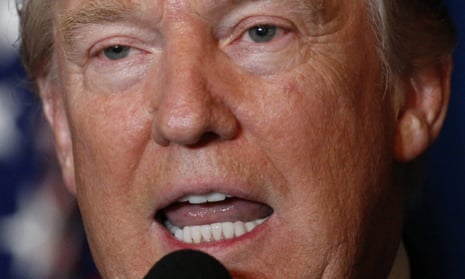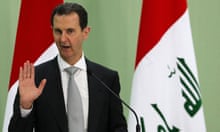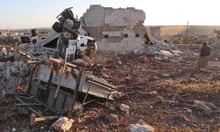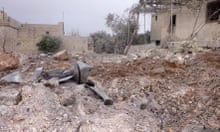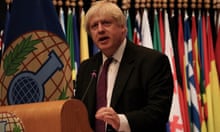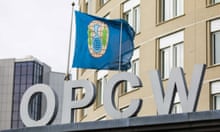When making life-or-death decisions, it does not do to become too emotional. Donald Trump’s angry, visceral reaction to television pictures of last week’s unforgivable chemical weapons atrocity by the Syrian regime in Idlib province is understandable on a human level. But for the man who commands the world’s most powerful military force, it is dangerous.
Dangerous, because by seeking impulsively to avenge one wrong, Trump has risked making the situation worse for the Syrian civilians he now, suddenly and implausibly, claims to want to protect. Self-indulgent, because in matters of war and peace, a US president, or any responsible national leader, cannot and should not allow himself to be guided by raw, untutored personal feelings.
When it comes to critical issues of international security and foreign policy, Trump is an amateur. Last week, he proved it. Not only does he lack experience, he also does not seem much bothered about learning to understand the complexities presented by challenges such as Syria’s civil war. Gut instinct is not a sound basis for military action on the scale of the missiles strikes launched against the Syrian regime of president Bashar al-Assad.
Luckily for us and Trump, the greenhorn US president was saved from the potentially deeply negative consequences of his own action by the advice of seasoned professionals including HR McMaster, his national security adviser, and Jim Mattis, his defence secretary.
Thanks to their common sense, not Trump’s theatrics, the US attack was limited in scope and duration. It was evident retaliation for the sarin gas attack in Idlib, not a larger operation. Its aim was plain: to curb the regime’s capacity and appetite for using chemical weapons in future. Crucially, Trump’s advisers ensured the Russian government was informed in advance. This allowed Russian and allied Syrian personnel to evacuate the targeted airbase, thereby mitigating the likelihood of an escalating US-Russia confrontation. The Americans claim the missile strikes were largely accurate and civilian casualties kept to a minimum. This is disputed and there are reports that the airbase is already back in use.
Judging by the measured reaction from Moscow, Trump may have got away with his first, big Tom Clancy-ish power play as commander in chief. The US and Russia are not close to war, whatever Dimitry Medvedev, Russia’s placeman prime minister, may say.
The Russians have suspended a military-to-military agreement on aerial operations in Syria and sent a warship into the eastern Mediterranean. But Russian commanders did not activate their sophisticated, ground-to-air missile defence systems, which could, in theory, have intercepted the American cruise missiles. So far at least, this is a restrained reaction to a provocative, maverick act of war. Long may it continue.
Like the political chess player he is, Vladimir Putin, Russia’s president, looks intent on letting the inherent contradictions and weaknesses of Trump’s position do his work for him. Putin’s statement that the US attack was an act of unlawful aggression against a sovereign state is a strong opening gambit.
Although Rex Tillerson, the secretary of state, tried to plead self-defence, the unilateral US action has no justification in international law. Nor was it authorised by the UN security council, either specifically or by prior resolutions on Syria. We have been here before, as Putin very well knows. Trump’s reckless behaviour carries a chilling echo of the illegal Iraq invasion of 2003.
Putin will also be content to let western politicians such as Labour’s Jeremy Corbyn, aid agencies and humanitarian organisations make the obvious, irrefutable point that escalating military action is the very last thing Syrians want or need.
The vast majority of the estimated 400,000 civilian dead since 2011 have been killed by conventional, not chemical, weapons. Syrian civilians are still dying, every day, despite Russian and US-backed peace processes. The refugee crisis that has seen more than half the country’s population displaced continues unabated. These horrors are fed upon, in turn, by jihadi groups that oppose both the west and Assad. Bomber Trump’s big blast did nothing to deter Islamic State. On the contrary, it may help it.
The confusion that now reigns in Washington and European capitals over exactly what is the Trump administration’s Syria policy, and whether this was just a one-off strike or the beginning of a new push for regime change, will be music to Putin’s ears.
While he stealthily reasserts Russia’s leverage in the Middle East, the US and it allies appear to be back at square one. Trump’s UN ambassador, Nikki Haley, suggests more attacks will follow if Assad again resorts to chemical weapons. This directly contradicts the White House idea of a “one-off” strike.
Tillerson said a week ago that Assad’s future was solely for the Syrian people to decide. Now he is saying Assad must go. Trump’s spokesmen claim to have a long-term plan for ending the war, but they cannot discuss it because it is “classified”.
This is worse than a bad joke. It is made at the expense of Syria’s people and hapless allies, including Britain, who trail along in Trump’s wake, feverishly trying to make sense of his nonsense. It is devastating, but not far fetched, to think that Trump’s hopelessly mixed signals may have encouraged Assad to believe he could get away with the sarin attack, assuming Washington would look the other way.
Assad apologists say he is not mad, that he had no reason to use chemical weapons in Idlib. But his army is war-weary and exhausted. His country is cratered and his six-year reign of terror has not brought the end of the war any closer. His previous sarin and chlorine gas attacks have gone unpunished. After six years of fighting, and now with Russia’s and Iran’s active help, Assad wants to finish the war. The Idlib atrocity, spreading terror and dismay, may have been previewed in Damascus as a short cut to victory.
Trump’s gunslinger’s approach, injurious to Syrians, furthers some hard-headed, geopolitical objectives. This unsubtle demonstration of American firepower was aimed not only at Assad but at last week’s visitor to Mar-a-Lago, the Chinese president, Xi Jinping, at North Korea’s missile-toting leadership and at anybody in Iran or elsewhere who may want to pick a fight, figuratively or literally, in future.
It reassures Turkey and Washington’s Sunni allies in the Gulf that the US is on their side, a message reinforced last week by Theresa May’s Saudi visit. And it sends a message over Russia. In bearding Moscow, Trump has made it harder for critics in Congress and the media to stand up claims that he is a Russian puppet. And it reminds Putin, whom Tillerson will meet in Moscow on Tuesday, that he does not have a free hand. Trump did nothing at all last week to help the suffering people of Syria – but he did cynically advance his own political interests.
